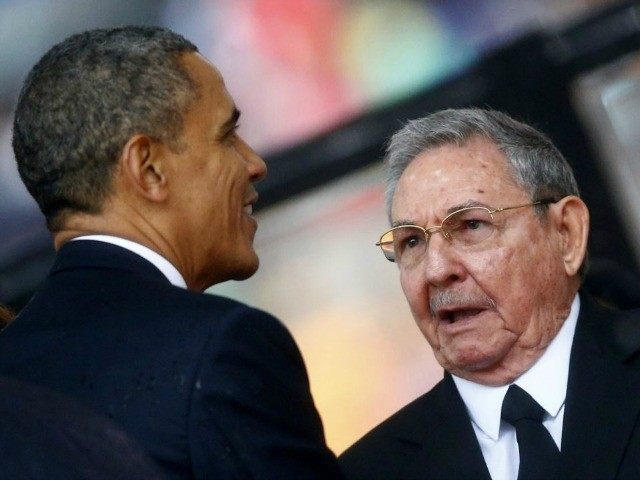American officials have confirmed that President Barack Obama will engage Cuban dictator Raúl Castro in an unspecified “interaction” at this week’s Summit of the Americas, set to begin on April 10. Human rights advocates fear any recognition of Castro will lend the rogue nation legitimacy internationally, undermining the struggle of political dissidents on the island.
The Miami Herald quotes U.S. assistant secretary of state for Western Hemisphere Affairs Roberta Jacobson — who has led American diplomacy with Havana’s intransigent team since Obama announced a list of concessions to the Castro regime in December — as confirming that the heads of state will meet. “There will be an interaction,” she told the newspaper, though not elaborating on the nature of such.
An unnamed “senior U.S. official” used similar language with CNN, confirming that, “Since they’re at the summit they’ll certainly interact but currently no formal bilateral meeting (is) scheduled.”
One expert speaking to the Herald, the Brookings Institute’s Ted Piccone, predicted an “important handshake,” but not “a lot of hugs and kisses.”
This will be Cuba’s first appearance at the Summit of the Americas since its establishment since 1994. Obama and Castro first shook hands at the funeral of Nelson Mandela in 2013.
In addition to Cuban communist officials, several political dissidents and pro-democracy activists are expected at the summit in Panama city. According to the Herald, the list includes “Manuel Cuesta Morúa, who heads the dissident Socialist Democratic Current in Cuba; independent journalist and dissident Guillermo Fariñas; Berta Soler, president of the Ladies in White; and Elizardo Sánchez, who heads the Cuban Commission for Human Rights.”
At least one of these, activist Rosa Maria Payá, has already been detained and harassed by communist officials in Panama. Payá was arrested upon landing in Panama City on Sunday “The national security agents have detained me at the door of the plane,” she alleged in subsequent tweets, claiming police told her, “You are going to be deported to Cuba if you cause any trouble or start raising banners. Go back to your own country to cause trouble.”
The government of Panama has since apologized for “any bureaucratic error” that may have occurred with Payá.
On the island, Cuban officials have rounded up a number of democracy activists in anticipation of pre-summit activity. Among them is Jorge Luis García, known popularly as Antúnez, who has not been seen in public since his arrest on April 1. García, who attended Obama’s State of the Union address this year at the invitation of House Speaker John Boehner, was arrested protesting in front of the Panamanian embassy in Havana (Rosa Maria Payá also attended the State of the Union, as a guest of Sen. Marco Rubio).
While many claim to expect a moment of reconciliation between Cuba and the U.S. at the summit, keen observers of the increasingly belligerent language of the Castro regime since Obama’s concessions predict that the communist leader will capitalize on the moment to attempt to humble the American president. Following Obama’s December speech, Castro told the Cuban legislature that communism had “really won the war” and that Cuba would not yield to a single American demand.
“In the White House’s lack of moral clarity, the region’s bullies smell weakness. One result is that a Caribbean backwater run by gangster brothers now has the upper hand in setting the regional agenda,” writes Mary Anastasia O’Grady in the Wall Street Journal this week, noting that an Obama attempt to warm up to the similarly oppressive regime of Venezuelan strongman Hugo Chávez resulted in Chávez “presenting him a copy of the famous anti-American diatribe ‘The Open Veins of Latin America.’”
Venezuela, incidentally, has become the second most important protagonist in the song and dance preceding the summit. As the United States extends diplomatic warmth to Cuba, Venezuelan leader Nicolás Maduro plans to present Obama with a petition signed by ten million people calling for Obama to remove sanctions on Venezuela imposed by executive order. Obama signed these sanctions into law last month, decreeing Venezuela an official “national security threat” to the United States due to a laundry list of human rights abuses and ties with terrorist groups like the Iran-backed Hezbollah.
In attempts to collect the ten million signatures — a tall order in a small country run by a highly unpopular head of state — Maduro’s government is forcing state employees to sign or resign from their jobs, and offering the nation’s poor incentives like free chickens in exchange for their signatures.
Reports indicate that Obama is not arriving at the Summit of the Americas with any intent to repeal sanctions against Venezuela. On the contrary, a report by Infobae notes that the President will be spending time before the summit in Jamaica, helping the Caribbean slowly wean off dependence on Venezuela for oil. “One of his principal objectives is to offer more support to Caribbean nations to reduce their energy independence on Venezuela,” the report reads, noting that Vice President Joe Biden had on previous occasions hinted at an American desire to help Caribbean nations find alternate energy sources.

COMMENTS
Please let us know if you're having issues with commenting.